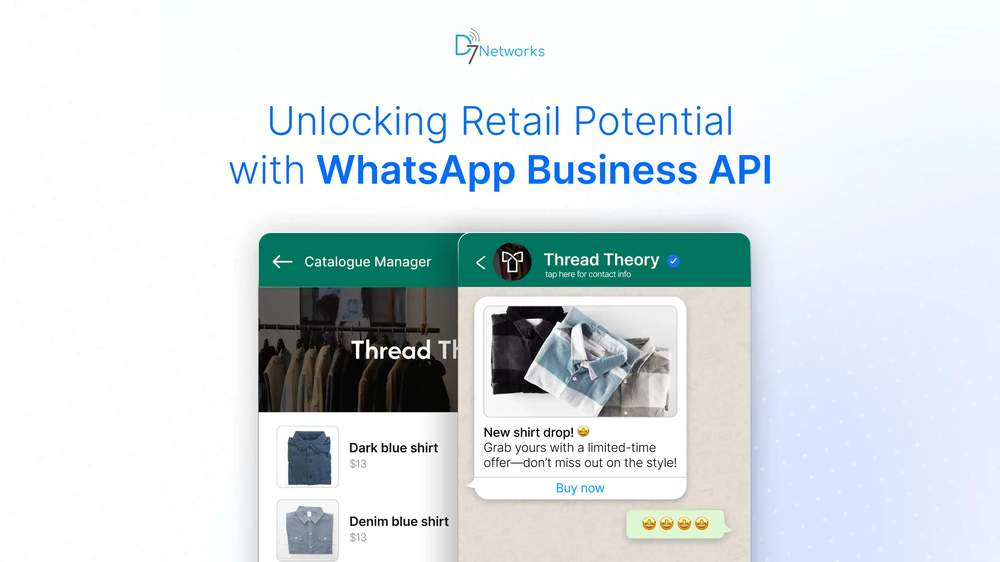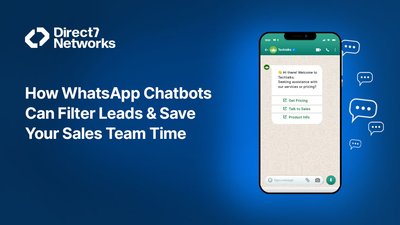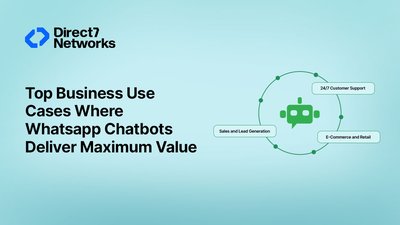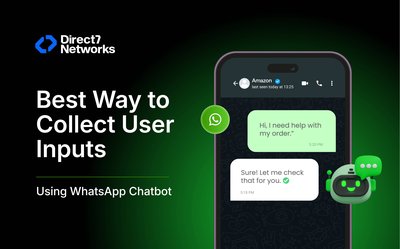
Boost Retail Sales Efficiency with WhatsApp Business API
Learn how WhatsApp Business API is revolutionizing the retail industry by improving customer support, boosting sales, and offering real-time, personalized communication.
The retail industry is facing a rapid shift towards digital-first experiences. As customers increasingly expect instant communication and personalized interactions, businesses must adapt or risk falling behind. Enter WhatsApp Business API, a tool that's helping retailers solve key challenges like high cart abandonment, customer service bottlenecks, and lack of personalization. With over 2 billion users, WhatsApp is becoming an indispensable platform for connecting with customers, boosting sales, and streamlining operations.
Ready to transform your retail business with WhatsApp? Let’s explore how!
The Challenges Retailers Face Today
Retailers are battling several issues in today’s competitive market:
- High cart abandonment rates due to lack of follow-ups.
- Inefficient customer support, leading to customer frustration and churn.
- Difficulty in personalizing offers across different customer segments.
- Limited post-sales engagement, reducing customer loyalty.
These challenges require modern solutions—and that’s where WhatsApp Business API comes in.
Key Features of WhatsApp API for Retailers
The WhatsApp Business API offers a range of features to help retailers address these challenges, providing real-time communication, personalized messaging, and powerful automation tools. Let’s dive into some key features:
1. WhatsApp ChatBot Integration
With the WhatsApp API, retailers can implement ChatBot integration to offer 24/7 customer support. Chatbots can handle high volumes of inquiries, guide customers through the purchase process, and collect valuable feedback. For example, a chatbot can help customers find products, answer FAQs, and recommend related items based on browsing history.
Want to offer personalized, round-the-clock support? Get started with a WhatsApp ChatBot today.
2. Automated Notifications
Automation is a game-changer for retailers. With automated notifications, businesses can send real-time updates like abandoned cart reminders, back-in-stock alerts, and shipping confirmations. These timely messages keep customers engaged, driving them back to the store to complete purchases or take advantage of promotions.
3. WhatsApp Bulk Messaging
Retailers can reach large groups of customers with bulk messaging, sharing promotional offers, product updates, or seasonal discounts. With WhatsApp’s in-chat catalog feature, customers can browse products, ask questions, and even make purchases directly in the app.
Real-Life Impact: How WhatsApp API Enhances Customer Experience
The WhatsApp Business API enables retailers to deliver smooth, real-time, and personalized communication. Here’s how it drives value for businesses:
1. Scalability
Handling a surge in customer inquiries during peak times (like Black Friday) is easy with WhatsApp’s scalability. Whether managing hundreds or thousands of messages daily, the API supports high volumes without compromising on speed or quality. Use WhatsApp API to handle customer support during high-traffic periods, reducing wait times and improving customer satisfaction.
2. Easy Integration with Existing Systems
The WhatsApp API seamlessly integrates with CRM systems, inventory management tools, and more. This means businesses can manage customer interactions without needing to overhaul their existing setup. Retailers can use CRM integration to send personalized offers based on customer history and preferences, creating more targeted campaigns.
3. Personalized Messaging
Retailers can create highly personalized messages, addressing customers by name and sending offers that match their shopping preferences or location. Personalization makes customers feel valued and leads to higher engagement rates.
4. Instant Connectivity and Real-Time Engagement
WhatsApp’s instant connectivity allows businesses to engage customers in real time, answering questions and solving issues immediately. This leads to higher customer satisfaction, as inquiries are resolved quickly, reducing the need for follow-up interactions.Retailers can use WhatsApp’s real-time communication to offer live shopping assistance, guiding customers through the purchasing process while answering their questions.
Want to offer real-time support? Leverage WhatsApp for instant customer interactions.
5. In-Depth Analytics and ROI Tracking
The WhatsApp API offers in-depth analytics, allowing retailers to track message performance, engagement, and customer responses. This data helps retailers refine their marketing strategies and measure the return on investment (ROI) for each campaign.
6. Security, Compliance, and Trust
With the Blue Tick badge and end-to-end encryption, WhatsApp ensures that customer conversations are secure and trustworthy. This is especially important for retailers handling sensitive customer information like payment details.
WhatsApp Marketing Strategies for Retailers
With over 2 billion users worldwide, WhatsApp provides retailers with unparalleled opportunities to engage with their audience. Here’s how retailers can maximize their marketing efforts with WhatsApp:
Create VIP Customer Groups
Creating VIP WhatsApp groups for your most loyal customers is an effective way to offer them exclusive deals, early access to sales, and personalized discounts. This not only boosts customer retention but also turns loyal customers into brand advocates.
Send Personalized Offers Based on Customer Data
WhatsApp allows retailers to send personalized offers that resonate with customers based on their past purchases and preferences. By targeting the right customers with the right messages, you can significantly improve conversion rates.
Use Automated Messaging for Immediate Assistance
Automated messaging tools, like WhatsApp chatbots, can handle FAQs, guide customers through the buying process, and provide quick responses even during off-hours. This ensures that customers receive immediate support, improving their experience and reducing wait times.
Broadcast Campaigns and Seasonal Promotions
Retailers can use WhatsApp Broadcasts to send bulk promotional messages to a large customer base. Whether it’s a flash sale or a seasonal discount, broadcasts ensure that your message reaches as many customers as possible quickly.
By incorporating these WhatsApp marketing strategies, retailers can create meaningful connections, enhance customer experiences, and increase sales. With its real-time, personalized communication, WhatsApp helps retailers engage their audience and stay ahead in the competitive retail market.
Ready to take your retail business to the next level? Start leveraging the power of WhatsApp Business API today!
Frequently Asked Questions
1. What is the best tool for WhatsApp Business API to boost retail sales?
D7 Networks provides a seamless WhatsApp Business API solution with features like automated notifications, chatbots, and real-time analytics, helping retailers reduce cart abandonment, enhance customer support, and drive sales.
2. What are the benefits of integrating a WhatsApp chatbot for retailers?
A WhatsApp chatbot can provide 24/7 customer support, handle FAQs, assist customers in finding products, and even recommend items based on browsing history. This automation reduces wait times and enhances customer satisfaction.
3. How does the API help retailers personalize customer communication?
Retailers can send messages addressing customers by name and create offers based on their shopping preferences, past purchases, or location. Personalization fosters stronger connections and increases engagement.




